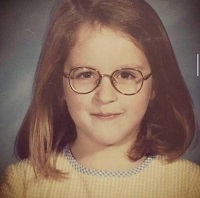Finding My Advocate Voice: A Note on Disability and Eating Disorder Recovery
Long before therapy, dietitian, and group appointments, my parents took me to countless doctors appointments because of my disability. I was born with optic nerve hypoplasia, a medical condition resulting in low vision. My eye disease can cause various degrees of blindness and also can come with a variety of co-existing conditions. I was very aware from a young age that I was a kid with low vision with a handful of potential medical problems that all needed “fixing.” Due to potential growth side effects, I went to an endocrinologist in Kindergarten who introduced me to dieting. Aha! If I couldn’t control my eyesight, I was supposed to control the rest of my body through what I did and did not eat. Message received. I remember walking into my Kindergarten class with a bow in my hair and a diet workbook in my hand.
***medical professionals told this little Kindergartener that she must diet to control her body size***
Fast forward almost twenty years. I was living in Nashville in the middle of a difficult eating disorder relapse. As I sat on the therapy couch a few weeks after an eye surgery, my therapist Courtney brought up my low vision and how it factored into my disorder. For the first time in my ten years of ED treatment, a clinician brought up my low vision without hesitation. So often in eating disorder treatment we hear a phrase like, “It is NOT your body that is out of control. You are using behaviors to control something in your LIFE that is out of control, it is NOT about body.” But what if it is (or part of it, anyway)? After such a long fight with my eating disorder, I realized that one of the functions of my disorder was to control my body that often felt like it was rebelling against me. Eye pain, migraines, limitations, teasing from kids, and missed opportunities due to my low vision could be numbed with the quick fix of an eating disorder…or so I thought.
As I did the work in therapy and eventually moved to New York, I also began to work in the disability advocacy and inclusion space. The more I learned about disability rights, disability justice, and the social model of disability…the more empowered I felt as an individual with low vision. When I was a kid in school, all of my accessibility needs were met, and I had parents who advocated for me. But I had to learn to strengthen MY OWN self-advocate voice as a college student and as a professional actor in NYC. Your advocate voice is the voice that stands up for what you will and will not tolerate. The advocate voice is the voice that makes sure you get your own needs met, first and foremost. And your advocate voice is your fiercest protector and fighter.
Over time and with much practice, my advocate voice got louder and my eating disorder voice faded into a whisper. As I embraced my low vision, I felt eating disorder recovery easier to embrace, too. I had to come to terms with some of my own internalized ableism and learned views of disability. My low vision is not something to feel embarrassed about. My low vision is not something that inconveniences others. My low vision is not a burden. My low vision (and all the side effects that go with it) is a part of me. My disability has taught me how to embrace vulnerability, how to fight with tenacity, and how to rise with resilience. And you know what? Eating disorder recovery taught me those things, too.
I write this for anyone with a disability who is struggling with an eating disorder…I see you. I also write this for clinicians. Disability is not a bad word. Disability is not an elephant in the room. My hope is that more individuals in the recovery community can hold space for honest disability dialogue. It is about time we empower ourselves and others on disability, so that we can build a more inclusive recovery community.
Alie B. is an optimist, actor, and disability inclusion consultant. She has performed on tour, off-Broadway, and regionally. When not onstage, Alie B. works with arts organizations, businesses, and educators on building a more inclusive world for people with disabilities. She is currently pursuing a Master’s in Arts in Medicine from the University of Florida. For more, visit www.aliebgorrie.com (Instagram @aliebg)

